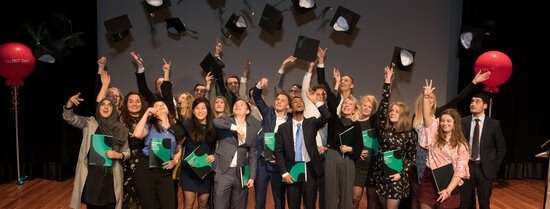Research by Erasmus University Rotterdam has shown that international students like to live and work in the Netherlands after graduating. But how do they find a job on the Dutch labour market after their studies? What can they do themselves? But also: what can Dutch companies do?
Figures from Erasmus University Rotterdam show that almost 90 percent of foreign graduates of this university have found a job within six months. The 10 percent who have not (yet) found a job have continued their studies, started travelling or have simply not been hired anywhere yet.
It is not self-evident that foreign students find a job immediately after their studies. Joep Elemans, director of the RSM Career Centre at Erasmus University, guides the students in this. "We offer the students a compulsory online course in which they mainly learn to ask themselves who they are, what they want and how to go about a job interview at a Dutch company."
The university also has a large alumni network where students can get in touch with more experienced people.
Language remains difficult
What are problems that international graduates can run into? "What remains is the language," says Elemans. "Speaking the language is always helpful, of course. That gives a big advantage."
Something else Elemans sees is that foreign students are not always used to thinking about what they want for themselves. "Sometimes it comes from their upbringing, or from their parents. In the end, it's all about having a good network, mastering the language and above all: knowing what you want."
The way of applying for a job is also different in the Netherlands, according to Elemans. "Here a job interview is really a two-way street. You are expected to start a conversation. That is not something foreign students are immediately comfortable with."
Very difficult to find a job
RSM-alumnus Kristian Voldrich came to the Netherlands from the Czech Republic in 2013 for his bachelor's degree. Initially, he experienced it as "very difficult" to find a job in the Netherlands.
The biggest problem? "I didn't speak Dutch." Voldrich now speaks fluent Dutch and has founded College Life Work, a platform for foreign graduate students. "The mission is to help international students find a job."
In recent years, Voldrich has discovered that for an international student, five factors are important in finding a job. "First: the region. Look for regions where they want foreign students, such as Rotterdam, The Hague and Amsterdam."
Company culture is often very Dutch
The study people have done can also work in their favour. "People who have done technical studies find it easier to get a job." In addition, according to Voldrich, it is advantageous if you come from an EU or EEA country. "Then you have the same rights as a Dutch graduate."
Fourth, Voldrich notes that large companies often have a very Dutch corporate culture. "This is a barrier for foreign students, also because of the language." Elemans understands that. "But the Dutch language belongs to a Dutch company. In Spanish countries they talk Spanish at the coffee machine. Here it is Dutch."
Finally, Voldrich recommends looking at a company's customers. Does a company have many foreign customers? "Then it's much easier for international students."
Students want to know what they can do for the world
To make the job search easier, Voldrich obviously has tips. "It is not necessary to speak the language fluently, but if you show that you are trying, already more doors open for you. People see that you really have ambitions to live and work in the Netherlands. It commands respect."
Another tip is to find a side job while studying. "That way, you can find out whether you would like to continue working in the Netherlands, yes or no. It's very useful, because planning a career is very difficult. Very useful, because planning a career is difficult."
Finally, Elemans has a tip for companies that want to attract international students. "A student thinks very much about 'what's in it for me?' and what they can mean to the world. It is therefore important for an organisation to be able to respond to this. If you can make that clear as a company, the students will be the winners."
Read the full article on nu.nl (in Dutch).

